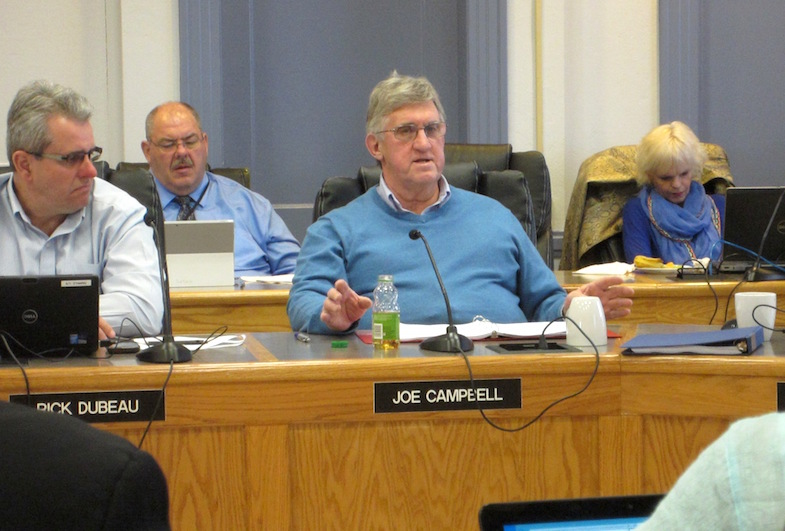A recent ruling from the Supreme Court of Canada caused a lengthy discussion at City Hall on Monday evening.
City Clerk Steph Palmateer summarized the decision, which now takes effect Canada-wide.
“Basically the Supreme Court upheld a lower court ruling that council must separate their religion from state. The court ruled, that by saying a religious prayer at the opening of a council meeting, they were infringing on the rights of those who may not share those religious beliefs,” he said.
The decision stems from a legal battle in the city of Saguenay, Quebec, where the local council cited a seemingly Catholic prayer before their meetings.
Councillor Pat Bamford was the first to raise his hand to share his thoughts on the matter.
“Times are a changing I guess in our society,” he said.
He then spoke about something he calls a ‘historical fact.’
“Our criminal code and our human rights codes, in virtually all Western societies, are based on the values and traditions of the Judeo-Christian faith. I’m mentioning that because there’s an irony here. The folks that have no faith, which is fine, are calling on the human rights code, which was crafted from the values of our ancestors who had the faith that created the human rights code that they are now using to remove any references to faith in the public sector. I find that ironic,” said Bamford.
He then described how the Supreme Court’s decision was in fact, quite sensible.
“It is wise that we make sure that the governments in Western societies, and hopefully around the world, are religiously neutral. In the past where we’ve had societies, even in the Western world, where religious figures were dominant and they ruled the government of the day. There was incredible intolerance, abuse, and victimization of people in the name of religion. We only have to look at what’s happening in other parts of the world, where we see that occurring right now,” said Bamford.
If council continued with the prayer, they would be opening themselves to potential lawsuits.
Mayor Steve Black read council the four options available:
-
A moment of silence and reflection
-
To find a non-denominational prayer
-
To remove the prayer from all future meetings
-
To continue on with the prayer in place.
Councillor Joe Campbell said he had ‘great difficulty’ with the ruling.
“I think it’s a sad day for Canada when we are not allowed to say a prayer before a council meeting.”
Councillor Mike Doody said that in his 32 years on council he has never heard a single complaint about the prayer.
“The world is ‘topsy turvy.’ We now are seeing around the world, the definitions of freedom of speech. And now with freedom of speech, you can attack, mock and make fun of Christian leaders, and of all denominations. Riots are being caused because of it. Where are we going? Well that’s where life is taking us these days,” said Doody.
Councillor Walter Wawrzaszek was the most vehement in voicing his objection.
“As a Christian, I would be amiss if I didn’t voice how I feel. It is pretty bad when one person in Quebec, with a strong voice and a lawyer, can change the way things have always been done, and now make the whole country endear to their wishes. As for the four options, a moment of silence has always been reserved for a death or a tragedy. Number two is out. Three (shakes head). I like number four. Prayer should be the one we pick,” he said.
Councillor Andrew Marks agreed with Wawrzaszek.
“I prefer that we do nothing, and keep things as is. My own faith is something that is personal. It’s not something that I enforce on others. I’m certainly looking at an option that allows me to do what I feel appropriate, as has been the tradition of this council,” said Marks.
Councillor Rick Dubeau was not as offended as other members of council.
“I’ll support the moment of silence, that way we can all worship in our own manner. It respects everyone and I think it’s the best option we have at this point,” he said.
Mayor Black said it was ‘a sad day’ because of the long standing tradition of a prayer before Timmins city council meetings, but cautioned council about defying the Supreme Court of Canada.
“If council decides to stick as we are currently, I will have to go get some legal advice for the possible ramifications of that, just to ensure there isn’t any there for me personally. If council wants to take that risk upon the municipality, then that is a decision they can make. I think it’s pretty clear if you look at the cases that were outlined, there was some costs and punitive damages awarded, so it’s not something that I think we should take lightly,” said Black.
When it was time for the vote, council unanimously agreed to choose the ‘moment of silence and reflection’ option.
(PHOTO: Councillor Joe Campbell speaks during Monday's council meeting. Andrew Autio for TimminsToday)



